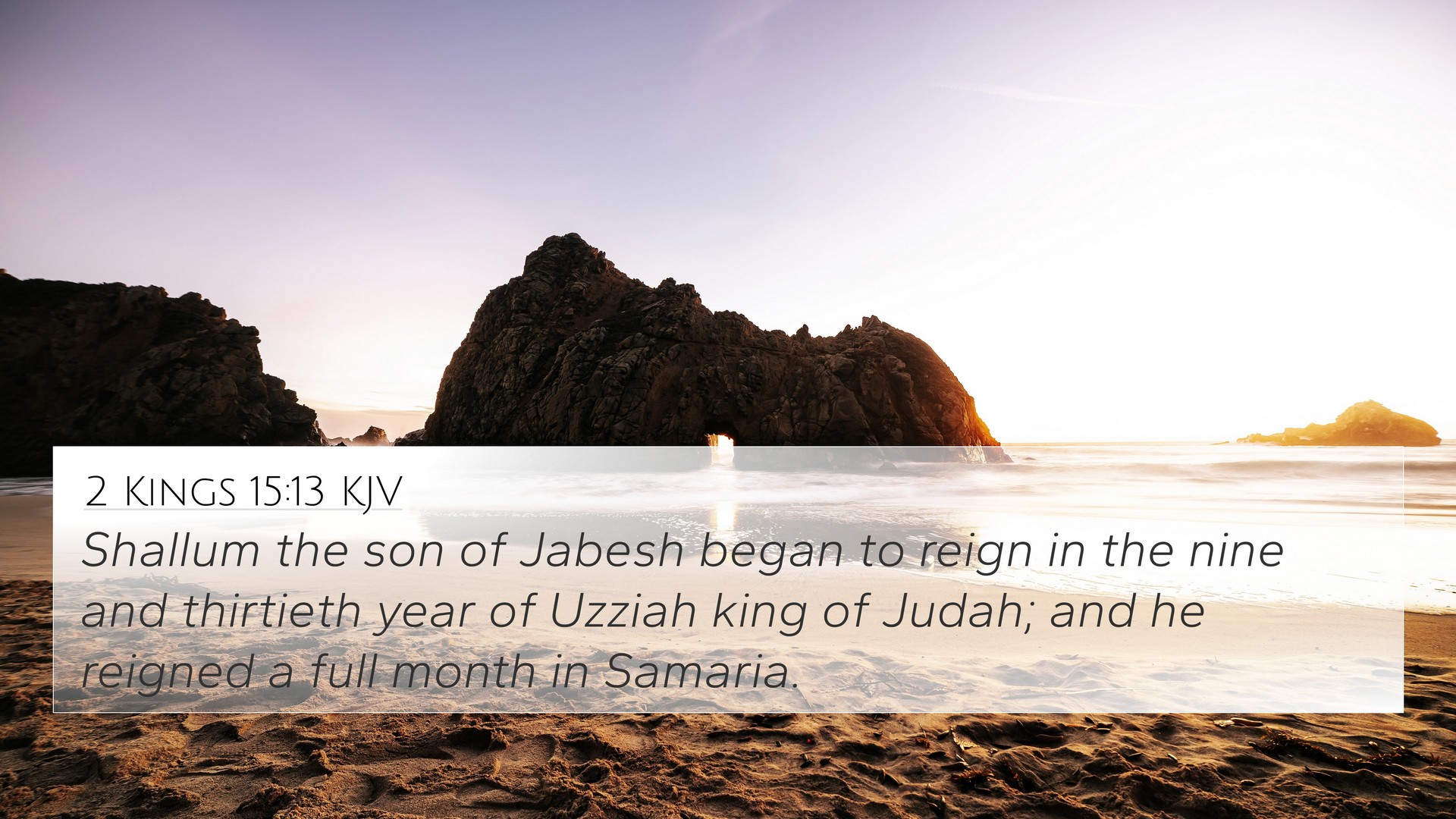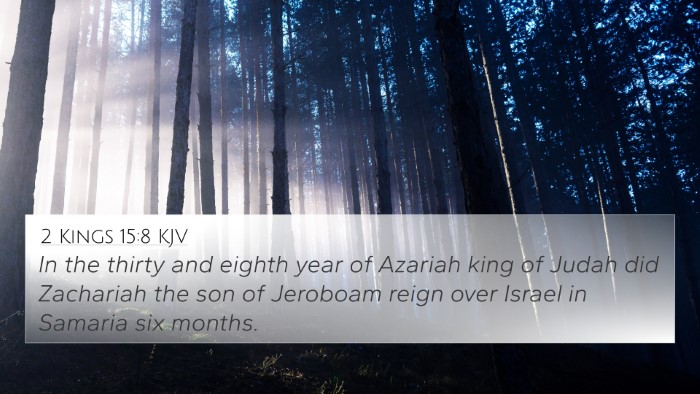Understanding 2 Kings 15:13
2 Kings 15:13 states: "Shallum the son of Jabesh began to reign in the thirty-ninth year of Uzziah king of Judah; and he reigned a full month in Samaria." This brief account of Shallum’s reign provides several insights into the historical and theological context of the Israelite monarchy.
Summary of the Verse
Shallum’s reign is noted for its brevity, lasting only one month in a turbulent period of Israel’s history, characterized by political intrigue and instability. His ascent to power came during the reign of Uzziah in Judah, indicating the intersecting timelines of the two kingdoms—Israel and Judah.
Thematic Insights
This verse, while succinct, opens a window into several themes regarding leadership, legitimacy, and the consequences of sin within the monarchy of Israel. Shallum's rule serves as a reminder of the transient nature of power and the context of violence and betrayal that often surrounded the kings of Israel.
- Transience of Power: Shallum's one-month reign illustrates how quickly power can change hands, particularly during a time of national disunity.
- Judgment of God: The brevity of Kings like Shallum often reflects God’s judgment on the nation for their idolatry and sin, a consistent theme throughout the Old Testament.
- Political Intrigue: The circumstances of Shallum’s rise suggest a backdrop of assassination and conspiracy, common in Israel’s fractured political landscape.
Biblical Cross-References
To better understand 2 Kings 15:13, consider the following related verses:
- 2 Kings 15:10: Details the assassination of Zachariah, providing context for Shallum's rise.
- 2 Kings 14:29: Covers the end of Uzziah’s reign and highlights the political atmosphere in which Shallum operated.
- 2 Kings 15:14: Discusses the immediate successor of Shallum, indicating the rapid succession of leadership.
- 2 Kings 15:16: Reflects on the violence in the land that paved the way for political shifts.
- Micah 2:12-13: Prophecy regarding leadership and the resulting consequences for corruption and injustice in Israel.
- Matthew 2:16: Connects the theme of kings and tyrants, even in a New Testament context, through Herod's actions against children.
- Psalms 146:3: Advises against placing trust in princes or earthly leaders, tying back to the ephemeral nature of leaders like Shallum.
Historical Context
Shallum ruled during a time of division between Israel and Judah. Political assassinations were rampant, and the nation was rife with idolatry and rebellion against God. This context is critical for understanding the significance of his brief reign and the broader narrative of 2 Kings.
- The Divided Kingdom: The separation of the two kingdoms plays a significant role in the political dynamics observed in the text.
- Assassination Culture: Shallum’s rise is a direct outcome of the culture of assassination that plagued Israel, marking a dark period in its history.
- Prophetic Voices: The role of prophets during this time is significant as they often warned of impending judgment, underscoring the nation's moral failings.
Theological Implications
The story of Shallum teaches about the sovereignty of God over human affairs. Despite the apparent chaos in leadership transitions, God's plan is unfolding. Each reign, however brief, contributes to the larger narrative of redemptive history.
- God's Sovereignty: Even in the tumultuous reigns, God remains in control and ultimately guides history towards His purposes.
- Consequences of Sin: The text serves as a warning about the ramifications of turning away from God, evident in the cycles of violence.
- Hope in Redemption: Despite the failures of earthly kings, the promise of a future King Jesus who reigns in righteousness never falters.
Practical Applications
In studying 2 Kings 15:13, believers can learn a variety of lessons applicable to their spiritual lives:
- Evaluate Trust in Leaders: Understanding the transient nature of human leaders encourages believers to place their trust in God alone.
- Be Aware of Cultural Influences: The culture of power in the church today can resemble the political turmoil of ancient Israel; vigilance is key.
- Seek God’s Guidance: Like the Israelites, believers should seek God's will and guidance amid uncertain times rather than relying solely on human wisdom.
Conclusion
2 Kings 15:13 may depict a succinct historical fact, but it invites deeper reflection on the themes of power, the role of God in history, and the importance of righteous leadership. It encourages cross-referencing with other scriptures to unveil a more profound understanding of God’s redemptive plan and the trials faced by His people.
Further Study and Reflection
In pursuing Bible verse cross-references like those found in 2 Kings 15:13, readers can utilize tools for cross-referencing such as:
- Bible Concordance: It helps to locate verses related to specific themes or topics.
- Bible Cross-reference Guide: This guide assists in drawing connections between different scriptures.
- Print and Digital Tools: Using various formats allows for a comprehensive study of these connections.











